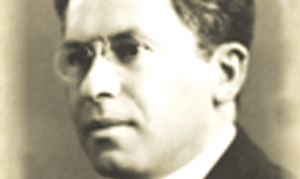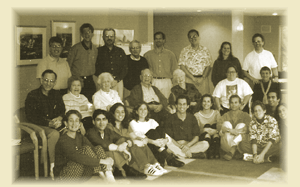A Turkish Jewish Profile: Maurice Amado

Maurice Amado (1888 to 1968) was born in Izmir, Turkey and came from a Sephardic Jewish family that lived for several centuries in the Old Ottoman Turkish Empire, following their ancestors’ expulsion from Spain in 1492. Amado emigrated to the United States from Turkey in 1904 where he settled in New York and, upon his retirement, resettled in Los Angeles in the 1950’s.
Amado was in the tobacco trade business, at first working for Standard Commercial Tobacco Company until he left to work for himself. With the proceeds from his profits in the tobacco business he became a successful financier and investor. He was married to Rose, who had a high-end dress business in New York City. Although Rose had a son from a previous marriage, they never had children.

Amado was a very cultured man. He taught himself English by attending lectures and speeches in New York City. He read a great deal, mainly philosophy and kept a large library in his home. He was also an excellent conversationalist.
He was extremely close to his nephew, Raphael Amado, who had five children. These children and their descendents have and continue to serve on the Maurice Amado Foundation Board of Directors which he established in 1961. Prior to establishing the Foundation he began his charitable work giving funds to a Sephardic congregation in Los Angeles. This congregation eventually merged and became the Sephardic Temple Tifereth Israel located on Wilshire Boulevard in West Los Angeles.
He established a scholarship fund at the Temple for the children of Temple members. His Foundation also funded both capital projects and programs at the Temple for several decades.

As one of the Foundation’s most lasting charitable gifts, the Maurice Amado Foundation established an endowed chair at UCLA to support research and teaching in Sephardic culture and history by a distinguished scholar in any of the disciplines associated with the broadest range of Sephardic concerns. This encompasses the entire historical and geographical scope of Sephardic culture and religion from its beginnings as a regional phenomenon in the Iberian Peninsula to its development as a widespread manifestation of Jewish social and intellectual experience throughout the world.

Maurice Amado.
Amado was a very cultured man. He taught himself English by attending lectures and speeches in New York City. He read a great deal, mainly philosophy and kept a large library in his home. He was also an excellent conversationalist.
He was extremely close to his nephew, Raphael Amado, who had five children. These children and their descendents have and continue to serve on the Maurice Amado Foundation Board of Directors which he established in 1961. Prior to establishing the Foundation he began his charitable work giving funds to a Sephardic congregation in Los Angeles. This congregation eventually merged and became the Sephardic Temple Tifereth Israel located on Wilshire Boulevard in West Los Angeles.
He established a scholarship fund at the Temple for the children of Temple members. His Foundation also funded both capital projects and programs at the Temple for several decades.

Amado family together.
As one of the Foundation’s most lasting charitable gifts, the Maurice Amado Foundation established an endowed chair at UCLA to support research and teaching in Sephardic culture and history by a distinguished scholar in any of the disciplines associated with the broadest range of Sephardic concerns. This encompasses the entire historical and geographical scope of Sephardic culture and religion from its beginnings as a regional phenomenon in the Iberian Peninsula to its development as a widespread manifestation of Jewish social and intellectual experience throughout the world.
Last modified onSaturday, 06 May 2017 10:07
Latest from Admin TOA
- World Energy Council Türkiye Holds the Opening Meeting of the Young Energy Leaders (YEL’26) Program
- The Shared Pulse by Eda Uzunkara
- NEO HUMAN 10.0: How Will the Future Be Shaped? (Filiz Dag)
- Calculatit.net Is Bringing Pricing Transparency to America’s Construction Industry
- Support Independent, Trustworthy Journalism








